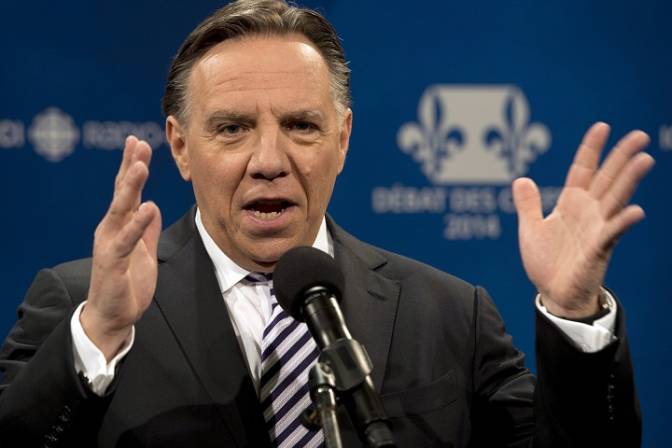When Coalition Avenir Quebec Leader Francois Legault recently dismissed the Montreal mayor’s popular plan for a new subway line, he didn’t feel it necessary to even pay lip service to the idea.

Valerie Plante’s “pink line” helped her win the 2017 municipal election as Montrealers dreamed of a shiny new transit project with stations to be named after women and minorities who helped build the multicultural city.
The Liberals and Parti Quebecois, who both hold ridings on the island of Montreal, publicly supported the project, despite acknowledging the embryonic plan was many years away, if it ever came to fruition.
READ MORE: ‘I feel like an underdog and I like it’: PQ leader not worried about trailing in polls
Legault and his party, which is popular in the far-flung suburban ridings surrounding the greater Montreal area, weren’t enamoured of the project.
“We have concluded it’s not the priority,” Legault told reporters at his party’s convention in May.
Pollsters have indicated the Coalition, which was created in 2011 and has never held power, can win the Oct. 1 provincial election without any of the 27 ridings on the island of Montreal.
And while the party has one or two chances of picking up a Montreal riding, its political base is in Quebec City and the surrounding areas known as “the regions.”
A major question is where the country’s second-largest city and Quebec’s economic engine will rank in the Coalition’s list of priorities should it take power.
Montreal, a Liberal party and federalist bastion, had a hard enough time getting attention when the sovereigntist PQ government was in power, said Peter Trent, ex-mayor of Westmount, a wealthy English-speaking enclave on the island of Montreal.
“I felt the difference,” Trent, who served as Westmount mayor between 1991 and 2002 and again from 2009 until last year, said in an interview.

Get daily National news
“Whenever the PQ was in power, a cold wind blew.”
Cities and regions across the province compete for attention and money from the capital, Quebec City, and constituents are often better served if their legislative member is in cabinet or is powerful within the government structure, Trent said.
The majority of the ridings on Montreal island are Liberal, and the members who hold those seats are almost all in Premier Philippe Couillard’s cabinet.
READ MORE: Liberals need to go in order to clean up Quebec politics: Lino Zambito
Montreal’s West Island, for example, is home to Finance Minister Carlos Leitao, Public Security Minister Martin Coiteux and Aboriginal Affairs Minister Geoffrey Kelley. To their geographical east is the riding of Saint-Laurent, represented by government house leader Jean-Marc Fournier.
The new, multibillion-dollar light rail train system under construction by the province’s pension fund, the Caisse de depot et placement du Quebec, travels right through all those Liberal, federalist ridings.
Kelley said having himself, Leitao and Coiteux around the cabinet table “certainly didn’t hurt” the project, which is also funded by the provincial and federal governments.
“It’s a project from the Caisse,” Kelley said in an interview, “but we wanted to make sure the concerns in the West Island were heard.”
Kelley, a 24-year political veteran who is not seeking re-election, is not ready to call victory for the Coalition in October, despite what the polls suggest.
He did acknowledge, however, that if Montreal is found “offside” politically, and has little to no elected representation in a future governing party, it would be a “big problem.”
“It’s been a long time, I can’t remember when that’s happened in Quebec history, so it would be a big problem because a lot goes on, on the island of Montreal,” Kelley said.
“Whether it’s our institutions, our infrastructure, it’s very important that people are close to the ground and understand those issues.”
Angelo Persichilli, who was director of communication for ex-prime minister Stephen Harper between 2011 and 2012, worked in government when the Conservatives didn’t have a single seat on the island of Montreal and only five throughout Quebec.
In his experience with Harper, he said, Quebec wasn’t treated any differently because it had fewer MPs compared to other provinces.
Persichilli did, however, offer an old adage: “Whoever is absent is always wrong.”
With the Liberals in power since 2003 aside from a short-lived minority PQ government between 2012 and 2014, the so-called regions are going to be putting a lot of pressure on Quebec City for attention if the Coalition wins, Trent said.
“There will be a tremendous amount of pull,” he explained. “They’ll say: ‘Now that we got you in power we want our goodies and it’s our turn.'”
The allegedly forgotten parts of Quebec are already getting attention ahead of the election campaign, which will officially begin this Thursday.
PQ Leader Jean-Francois Lisee recently called Montreal’s east end the Liberals’ “forgotten child” and accused the governing party of ignoring the area because its constituents largely don’t support it.
Legault’s best chance to pick up seats in Montreal, polls suggest, can be found in east-end ridings currently held by the PQ.
Lisee wants to cancel the Caisse’s light rail project to the West Island and is promising more investment in the east end of the island.
As for Legault, his transit proposal for Montreal focuses on the outer suburbs, which are coincidentally the areas where the Coalition enjoys political support.
He pledges to extend the Caisse’s light rail project to the bedroom communities to the north and south of the island of Montreal as well as extend highways around the city that stretch deep into its outskirts, about an hour’s drive from downtown.
And Legault’s transit project for the island of Montreal? A tramway in the east end.








Comments
Want to discuss? Please read our Commenting Policy first.